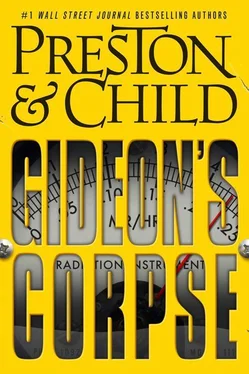“All right, moving on.” Dart opened a file and shuffled more papers. Fordyce had his notebook out and ready. Gideon chose to take no notes; he had discovered in graduate school that note taking interfered with his ability to assemble the big picture in his mind.
Dart spoke rapidly while looking at the papers in front of him. “The autopsy and analysis of the personal effects of Chalker are not finished, but we have preliminary results.”
Fordyce began scribbling.
“Nuclear spectroscopy from swipes of Chalker’s hands and neutron activation tests showed conclusively that there were traces of highly enriched uranium 235 on his palms and fingers. He’d handled it in the past twenty-four hours. Chalker’s clothes were contaminated with absorbed and adsorbed radioactive isotopes, including cerium 144, barium 140, iodine 131, and cesium 137. These are the classic fission products of a U-235 criticality event. The iodine 131 has a half-life of eight days, and we found a high level of it, so we know the accident took place no more than twenty-four hours ago.”
Dart glanced at Fordyce. “If some of this is confusing to you, Agent Fordyce, Dr. Crew will explain it later.”
He examined other sheets of paper. “The contents of his pockets have been inventoried. There was an admission ticket stub in his pocket, dated Friday last week, to the Smithsonian Air and Space Museum.”
Fordyce scribbled faster.
“Slow down before you burn out a tendon,” Gideon said, nudging Fordyce.
“There was a train ticket receipt, one way, Washington Union Station to New York Grand Central, dated yesterday afternoon. There was a piece of paper with a website address written on it and several phone numbers. The phone numbers are being analyzed.”
Fordyce glanced up. “The website address?”
“I’m afraid I’m not authorized to release that information.”
There was a silence. “Excuse me,” said Fordyce, “but I thought we were authorized to receive all information.”
Dart looked at him with his brightly gleaming eyes. “In an investigation like this,” he said, “there has to be a certain level of compartmentalization. Each investigator is given what he needs to know, and not more. We all have to work within parameters.” His glance shifted to Gideon. “For example, I’ve been denied information about the private contractor you’re working for.” He smiled, then went on in his dry voice. “An analysis of Chalker’s vomitus indicated his last meal took place at around midnight. It was crab soup, bread, ham, lettuce, tomatoes, Russian dressing, and french fries.”
“Whew,” Gideon said. “No wonder he’s radioactive.”
Another shuffle. “We recovered two credit cards, a driver’s license, a Los Alamos ID card, and various other items from his wallet. Those are being analyzed now.”
“What about the autopsy?” Fordyce asked.
“The preliminary results indicate damage to his thyroid gland, consistent with exposure to iodine 131. This—” He glanced at Fordyce—“is a major fission product of U-235 and indicates Chalker was exposed for some time to a low level of radioactivity before the criticality incident.”
“Do you have a sense of how long?” Gideon asked.
“Cell necrosis indicates more than eleven days.” Shuffle. “There were also classic indications of a massive exposure to ionizing radiation in the criticality incident, with exposure on the order of eight thousand rads. The skin and the internal organs all showed evidence of acute radiation syndrome, beta as well as gamma burns. The exposure was from the front, with the greatest exposure on the hands. The traces of highly enriched uranium on his hands suggest he was actually handling the material when it went critical.”
“Without gloves?” Gideon asked.
Dart looked at him. “Yes. And that’s something we’re wondering about, too, why he didn’t wear protective gear. Unless of course he…did not expect to live much longer.” A short silence followed this statement, and then Dart shut the file. “That’s all we have so far.”
Gideon said, “If that’s true, we don’t have a lot of time.”
“Why’s that?”
“It seems to me he was assembling the bomb.”
“How do you know?” asked Fordyce, turning to him.
“The simplest nuke—the one terrorists would build—is a gun-type bomb. Two pieces of U-235 are fired together in a tube to achieve critical mass. With a bomb like that, you keep those two halves shielded and you don’t bring the pieces anywhere near each other until it’s time to actually assemble the bomb. Because those two pieces, if they get too close without proper shielding, will exchange neutrons, go critical, and let loose with a burst of gamma radiation exactly like what hit Chalker.”
“So you’re saying Chalker was assembling the weapon and botched it?” asked Fordyce.
“That’s exactly what I’m saying.”
“So was the weapon ruined?”
“Not at all,” said Gideon. “It might be a little hot, but nothing a suicide bomber would need to worry about. The fact that the uranium went critical would have caused physical changes in the core that will, unfortunately, enhance the yield. It’ll make the bomb more powerful.”
“Son of a bitch,” muttered Fordyce.
“Very good, Dr. Crew,” said Dart. “Our own internal evaluation team has come to much the same conclusions.”
Fordyce asked, “What about his laptop computer? I heard they recovered one from his apartment.”
“The contents are encrypted. We haven’t been able to extract any information yet.”
“Then you should let me look at it. I recently finished a six-month tenure in the FBI’s Cryptology Unit.”
“Thank you, Agent Fordyce, but we’ve got a crack team on it and I personally feel your talents would be better used in other areas.”
There was a brief silence before Fordyce spoke again. “Any indication of the target?”
Dart looked at him steadily. “Not yet.”
Fordyce took a deep breath. “We need access to Chalker’s apartment.”
“Naturally you’ll have access. But NEST is first in the queue.” Dart consulted a calendar. “It’s going to be a couple of weeks, I’m afraid. We’ve got a long line of government agencies ahead of you.”
Gideon waited for Fordyce to react, but to his disappointment the agent didn’t respond. They rose to leave.
“May I have a private word with you, Special Agent Fordyce?” Dart said.
Gideon looked at Dart in surprise.
“I’m sorry, Dr. Crew, this is between us.”
Fordyce watched as Crew left. He wasn’t sure what Dart’s game was—he seemed like a straight shooter, but then everyone, even the best, had a game. Fordyce’s strategy had always been to hide his own game while figuring out the game of everyone around him. It had gotten him through FBI minefields for years.
After the door shut, Dart folded his hands and stared at Fordyce. “I’d like this to remain between us. I’m a little concerned, because, frankly, I find this assignment of yours to be rather odd.”
Fordyce nodded.
“I knew Dr. Crew briefly at Los Alamos. He’s more than bright. I have a high opinion of his abilities. But up on the Hill he had a reputation as a freelancer, someone who felt the rules were for others, not him. The qualities that make him a brilliant and creative scientist may not translate well into a criminal investigation like this. I’m asking you to keep an eye on him and make sure he doesn’t go off…half-cocked. That’s all.”
Fordyce kept his facial expression strictly neutral. It was true Gideon had a reckless, wiseass air about him that Fordyce didn’t like. He understood why Dart thought he had an attitude—because he did. But Crew was his partner, and although he wasn’t sure he trusted or even liked him, partnership loyalty trumped that. “Very well, Dr. Dart.”
Читать дальше












